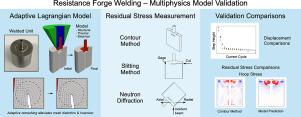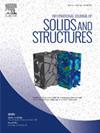Adaptively remeshed multiphysical modeling of resistance forge welding with experimental validation of residual stress fields and measurement processes
IF 3.4
3区 工程技术
Q1 MECHANICS
International Journal of Solids and Structures
Pub Date : 2024-10-24
DOI:10.1016/j.ijsolstr.2024.113112
引用次数: 0
Abstract
Welding processes used in the production of pressure vessels impart residual stresses in the manufactured component. Computational modeling is critical to predicting these residual stress fields and understanding how they interact with notches and flaws to impact pressure vessel durability. In this work, we present a finite element model for a resistance forge weld and validate it using laboratory measurements. Extensive microstructural changes, near-melt temperatures, and large localized deformations along the weld interface pose significant challenges to Lagrangian finite element modeling. The proposed modeling approach overcomes these roadblocks in order to provide a high-fidelity simulation that can predict the residual stress state in the manufactured pressure vessel; a rich microstructural constitutive model accounts for material recrystallization dynamics, a frictional-to-tied contact model is coordinated with the constitutive model to represent interfacial bonding, and adaptive remeshing is employed to alleviate severe mesh distortion. An interrupted-weld approach is applied to the simulation to facilitate comparison to displacement measures. Several techniques are employed for residual stress measurement in order to validate the finite element model: neutron diffraction, the contour method, and the slitting method. Model-measurement comparisons are supplemented with detailed simulations that reflect the configurations of the residual-stress measurement processes themselves. The model results show general agreement with experimental measurements, and we observe some similarities in the features around the weld region. Factors that contribute to model-measurement differences are identified. Finally, we conclude with some discussion of the model development and residual stress measurement strategies, including how to best leverage the efforts put forth here for other weld problems.

通过残余应力场和测量过程的实验验证,自适应重塑电阻锻造焊接的多物理模型
压力容器生产过程中使用的焊接工艺会在制造部件中产生残余应力。计算建模对于预测这些残余应力场以及了解它们如何与缺口和缺陷相互作用以影响压力容器的耐久性至关重要。在这项工作中,我们提出了电阻锻造焊缝的有限元模型,并通过实验室测量进行了验证。广泛的微观结构变化、近熔温度和沿焊接界面的大局部变形给拉格朗日有限元建模带来了巨大挑战。所提出的建模方法克服了这些障碍,从而提供了可预测制造压力容器残余应力状态的高保真模拟;丰富的微观结构组成模型考虑了材料的再结晶动力学,摩擦-绑定接触模型与组成模型协调以表示界面结合,并采用自适应重网格化以减轻严重的网格畸变。模拟中采用了间断焊接方法,以便于与位移测量结果进行比较。为了验证有限元模型,采用了多种残余应力测量技术:中子衍射法、等值线法和切分法。模型与测量结果的比较还辅以详细的模拟,以反映残余应力测量过程本身的配置。模型结果与实验测量结果基本一致,我们还观察到焊接区域周围的一些相似特征。我们找出了造成模型与测量结果差异的因素。最后,我们对模型开发和残余应力测量策略进行了一些讨论,包括如何在其他焊接问题上更好地利用本文提出的方法。
本文章由计算机程序翻译,如有差异,请以英文原文为准。
求助全文
约1分钟内获得全文
求助全文
来源期刊
CiteScore
6.70
自引率
8.30%
发文量
405
审稿时长
70 days
期刊介绍:
The International Journal of Solids and Structures has as its objective the publication and dissemination of original research in Mechanics of Solids and Structures as a field of Applied Science and Engineering. It fosters thus the exchange of ideas among workers in different parts of the world and also among workers who emphasize different aspects of the foundations and applications of the field.
Standing as it does at the cross-roads of Materials Science, Life Sciences, Mathematics, Physics and Engineering Design, the Mechanics of Solids and Structures is experiencing considerable growth as a result of recent technological advances. The Journal, by providing an international medium of communication, is encouraging this growth and is encompassing all aspects of the field from the more classical problems of structural analysis to mechanics of solids continually interacting with other media and including fracture, flow, wave propagation, heat transfer, thermal effects in solids, optimum design methods, model analysis, structural topology and numerical techniques. Interest extends to both inorganic and organic solids and structures.

 求助内容:
求助内容: 应助结果提醒方式:
应助结果提醒方式:


